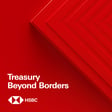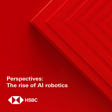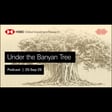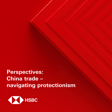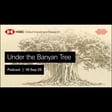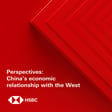Become a Creator today!Start creating today - Share your story with the world!
Start for free
00:00:00
00:00:01

Perspectives: Private equity in China
Dr. Fred Hu, Founder, Chairman and CEO of Primavera Capital Group and Oliver Kadhim, Head of Institutional Client Group, Asia, HSBC, dive into the evolving investment landscape in China, the importance of long-term partnerships, and the role of technology in driving future growth.
This episode was recorded on the sidelines of HSBC’s 12th Annual China Conference in Shenzhen on 2 September 2025.
Disclaimer: Views of external guest speakers do not represent those of HSBC.
Transcript
Introduction to HSBC Global Viewpoint
00:00:00
Speaker
Welcome to HSBC Global Viewpoint, the podcast series that brings together business leaders and industry experts to explore the latest global insights, trends, and opportunities.
00:00:12
Speaker
Make sure you're subscribed to stay up to date with new episodes. Thanks for listening, and now onto today's show.
00:00:21
Speaker
Welcome to the latest edition of the HSBC Perspectives podcast. My name is Oliver Kadim. I look after the institutional client group here in Asia. And today we're absolutely thrilled to be joined by Dr. Fred Hu of Primavera Capital.
Fred Hu's Journey from Goldman Sachs to Primavera Capital
00:00:35
Speaker
He's going to spend some time with us running through his thoughts on what is going on in the world today, how he invests, what he invests in. I'm very much looking forward to spending this time with you. So let's start really at the beginning and start with you.
00:00:47
Speaker
Tell us about how you got started, how you started Primavera. I know your background beforehand. If I read out your CV, that would take out take up the whole 20 minutes. But if we just start with you and your background and what led you to starting Primavera.
00:01:00
Speaker
When I retired ah from Goldman Sachs, I thought about going to academia or policy work.
00:01:10
Speaker
This was 2010, two years after the global financial crisis. And it really also coincided with the inexorable rise of China as economic powerhouse.
00:01:28
Speaker
um you know China overtook Japan as the technological economy, you know really start China starting as the quintessential world factory.
00:01:41
Speaker
So very exciting. And I guess, you know, this is right timing to really turn kind of ideas and the knowledge experience, ah put the money in where your mouth is as an investor.
Investment Highlights and Strategy at Primavera
00:01:56
Speaker
So to create a homegrown product with the investment firm and to tap into those emerging markets opportunities and you know so it's been an exciting journey you know and it's obviously been a successful journey no? yeah think it's quite rewarding and um you know we are fortunate the to have invested in um some of the you know best most innovative companies you know in mobile internet such as Alibaba in AI by dance you know FinTech Power has like and and there you know
00:02:35
Speaker
EV companies like ah Xpong and you know and so on and so forth. So on the forefront of innovation. 15 years later and we over $20 billion. dollars And you're sitting here today in Shenzhen, surrounded by even more of these hopefully future stars and some that have already done very well. And going through that list, I read the list of of the companies you were an early investor in.
00:03:01
Speaker
What is your secret source? And sitting in Shenzhen today, when you're meeting other companies, what is the special moment where you know that you're going to invest in that company? Yes, you know really first is really the tidal wave that we are in. I understand that at the tidal wave that we are headed, so the megatrends, the industrialization, ah organization, the rise the middle cost, and then you know given the sheer human capital base and the China's emerging role as a major global innovation powerhouse. So that's number one. Number two,
00:03:33
Speaker
Then you really just get to know ah quality, visionary, founders, entrepreneurs, and then you know find out the commonality, how we could support whether it's using capital and ideas or both but to enable them to succeed.
00:03:50
Speaker
So, you know, and unfortunately, a lot of different opportunities, you know, had to be really, really choosy and picky, but to what we think of the best in class. so But do you put yourself on the board as an investor? How involved are you with these companies? Or you do you put your complete trust in the CEO, the founder? I could have easily to gone to public market, given my background, but I think, you know,
00:04:12
Speaker
more challenging, but also produceed more stimulating is doing private because you cannot just make investment and then sit there pray. You have to wrap your sleeves.
00:04:24
Speaker
So whether it's joining the board or I even help the company recruit other talented ah managers, you know executives, and you know help them craft a strategy, fine-tune the business model, really make sure their vision ah coming to fruition, I had the value in order to create the value.
00:04:45
Speaker
So you go macro, you pick up the thematic, you then go down into the sector, you then go down into the company.
The AI Revolution and Open-Source Impact
00:04:52
Speaker
Correct. And then you actually get roll your sleeves up and get involved. So successful recipes. So then everyone's going to be asking the question of what's next. All we're hearing about and all we're seeing is ai robotics, life sciences.
00:05:06
Speaker
Are we close? Are we getting warm? Or is this already behind us? What is the next step? What are you looking at for 2026, 2027? Yeah.
00:05:14
Speaker
I think we're still in the beginning of this ah new tidal wave, you know, AI-centric technology revolution. ah You know, it's been a number of years, but, you know it's still ongoing, right? So particularly not so much in terms of development of, you know, large language model, the foundational gen AI, uh-huh.
00:05:34
Speaker
model, but they really how to use as a model, ah adaption into industries and you know society right to create a real value and the benefits for consumers and for enterprises.
00:05:47
Speaker
So like that, think we're still in the early days. So the opportunities, I think, are more how you're going to you know, service jewelers, different opportunities and pick the right ones, right, in terms of on a risk-reward basis. But drilling down into the, ne and not the names, but the actual, the companies, that the the sectors, you think, are we looking at autonous autonomous vehicles? Are we looking at... Yeah, that's a good example. Autonomous driving is a very good the example of user case for AI by autonomous driving.
00:06:17
Speaker
So definitely we have been very involved in autonomous driving company here in China, but also in the U.S., Are you global with your approach? There's no such thing as, ah you know, American AI or Chinese AI. There's only AI why for the world, for humanity.
00:06:29
Speaker
And we can't have a podcast and ah and spend time with you and not ask about the likes of DeepSeek and the impact that had. Globally, there are what about approximately 3,700 large language models.
00:06:41
Speaker
Last time I checked, there were 1,500 of those were in China and 700 were open sourced. Do we think that DeepSeek moment was a one-off or is this the start of things to come? I think it's the start of the, you know, a new paradigm.
00:06:55
Speaker
um You know, so, you know, up to that point, why mainstream understanding of models, lot of parameters, lot of tokens, and consume a lot of computer power.
00:07:09
Speaker
Therefore, ah you know the ability to acquire computer power or the mass of GPU is the sure bet towards the super intelligence.
00:07:22
Speaker
What the DICSEC has proven is that they know that's not the the only way, not the only path. There's also you know the model efficiency, the algorithm, the training you know matter as much as the you computer power. Open source is really just generated this um you know community and they know the best ideas put together and also really, really lowering the cost. why you know So as opposed to you know repeating that if you are a mover, you're becoming a monopoly.
00:07:53
Speaker
um Of course, you know you win, but they everyone will lose right because you have to pay ah lot to adapt to those technologies. With open sources, true democratization of the latest, most powerful with technologies in many generations. DeepSig, what they've done is not only just for China, but they would really for global AI. why So, you know, we need a vibrant open source community.
00:08:17
Speaker
And then going back a step to, once again, and the thematic behind it all, data centers. Is that an area that you've been invested in or that you've looked at? Yes, so we have looked at it like the technology, but you know data center, we have to know, consume lot of capital. why So it's infrastructure. chair So, you know, the lot of, as we speak, a lot of capital is flowing into a sector. so So we would choose more like, ah not so much infrastructure, but it's more how the verticals, how, you know, even traditional business like a consumer or banking and manufacturing, how they can
00:08:52
Speaker
adapt AI to transform their business model, improve their productivity, efficiency, is at lower cost, or engage outreach to their customers. right So that's all great examples of AI use case. So I think as investors, we are probably focused on you know foundational technology development, and then the adoption application of AI technologies.
Economic Trends and Challenges in China
00:09:17
Speaker
Now taking to a step into one of your other roles as an economist, let's talk about the tariffs um and the impact that's having globally. ah The question that I was really looking forward to asking you was about deflation.
00:09:30
Speaker
And with maybe less things going to the US, do you think China is going to start exporting more to Europe? And is that going to as it were, export deflation to Europe? Not necessarily.
00:09:41
Speaker
I think TAF, first of all, is a very negative for the global economy. It's a major source of instability and you know ah transaction cost ah to slow down global trade, which is central for global economic expansion.
00:09:56
Speaker
um you know China, being the largest trading economy and largest export, democracy on the one hand, is the most vulnerable to TAF. On the other hand, as the people often fail to recognize, China probably also has been the more weak ah to maneuver in that you know China has a huge domestic market.
00:10:18
Speaker
yeah Granted, right now, domestic demand is not um you know the strongest, why but there's clearly be huge potential for Chinese consumers to spend them more, for Chinese private sector enterprise to invest more.
00:10:34
Speaker
So domestic demand will more than offset whatever the last exports because of TAF. So, you know, that these the right answer for China's response to TAF is not to flood Europe or other markets.
00:10:50
Speaker
Obviously, there will be a trade diversification. So if you trade this with America, you trade more with the Southeast Asia, you know, Africa, ah South America, as well as Europe.
00:11:01
Speaker
But you know the key for China is concern there's not more exports, but there's really revive domestic demand to to make sure the Chinese economic growth will be sustainable.
00:11:14
Speaker
We all know China is the world's largest, most powerful efficient manufacturing economy. But the flip side is China is not the most big service economy, right?
00:11:26
Speaker
So as China developed, the service sector there you know has been like behind to also develop. so And you know the demand side is people need to spend more on services with them.
00:11:37
Speaker
Healthcare, education, entertainment, sports. Yes, child work. Are these sectors the ones, healthcare, are these sectors you'd carry, you said you're more TMT, a consumer. Yes. Are you looking at healthcare? Are you looking at, yes for sectors going forward? Yes, absolutely. So as we speak, you know, we see, you know, many green shoots in those areas. And, you know, obviously for us as university, you must say another, you know, white goods, native china' so you know, you know,
00:12:06
Speaker
But that's not the best way to get high return because China is full of those companies that are brutally competitive. But it's a heaven for consumers. right So what we're looking at is really services you know that could be dining, quick service us restaurants, and entertainment.
00:12:27
Speaker
and determined buta
Learning from Investments and Market Passion
00:12:30
Speaker
delivery app. Exactly. So that is infant, you know, as China is also not just simply replicate ah North America, Europe, you know, like a consumption pattern. as did Then you made a nuisance, you know, to spend the money off.
00:12:44
Speaker
Well, I've been impressed with the way, you know Little Red Book. Yeah. and The way that that has, the way people search on that now as we would a search engine, they now go looking to what would consider it a social media tool, but actually they go and search for the latest information.
00:13:00
Speaker
update of what's happened to any question they want to see the video version and then we know i met a company in china recently that can now um it can take down one hour video and compress it an hour video not just compress the file size but it can actually summarize it ai wise an hour video in 12 seconds yes we'll send you a summary of an hour video Yeah, all the Europe's, right. So what happened in China is they you know China is a little common in terms of middle class behind the Europe, behind North America.
00:13:28
Speaker
But um you know the major middle class, they first emulate the kind of lifestyle and the consumption pattern in developed markets. But they also leapfrog, you know, because what really happened in China, probably had or many others, is really the digital-centric, you know, consumer behavior. They really organize their lives, everything, right, you know, around maybe a mobile device. And what do you see? What you said earlier, when you were the beginning, what do you invest in? You find one driven ceo
00:14:00
Speaker
Can you delve into that? what Driven? Yes. But what else do they have to have? Well, you know, could you have a companion vision? by They have identified a very big problem they want to solve.
00:14:14
Speaker
and sink bay They big, they're very ambitious, and they have identified a concrete, specific problem. Okay, what they want to solve. And everyone, a list of the ones the names you've successfully invested in at early stage is long and well-published.
00:14:28
Speaker
How about some of the ones that didn't go well? Well, that's also a great learning experience. but So um you know this is has fun about investing. Sometimes inevitably you neverly yeah make the wrong call.
00:14:40
Speaker
but So then you have to you know go back to reflect you know why um this ah didn't succeed. why you know Is the with judgment of the founder's character, quality, or sometimes resilience.
00:14:56
Speaker
or is the technology is not, you know, ah the competitive advantage is not doable, right? So very soon there's not innovation easily take away the advantage, right? So that, you know, some is competition.
00:15:10
Speaker
um Yeah, so you do this analysis and hopefully next time you do even better, better job. So that's also, you know, learning never stops, you know, so you can learn from your both your successes but also your failures.
00:15:21
Speaker
Sometimes you learn more from your failures, right? If you learn how to do that and take it away, that is the ultimate stage in life. yeah um And what's next for you? So you're 15 years into the Premier League Historic. What's next? It's a continuation. It sounds like you said you retired once.
00:15:35
Speaker
You're 15 years into this story, but you're obviously your levels of passion and interest in the next wave of this technology that yeah we're seeing investments into. Is this going to keep you going for the next 15 years?
00:15:46
Speaker
Yeah, absolutely. So I enjoy ah what I'm doing. I yeah love what I'm doing. And already, I'm still young. um Yeah, so, you know, i I'm gratified, you know, we we have built a terrific team, very high quality, very we ah smart people.
00:16:06
Speaker
And we have, over the years, we have built this ah incredible ah partnership with the global, you know, blue chip institution investors from North America, Europe, Middle East.
00:16:18
Speaker
as well as from the world in Asia, a great generation. And we have built this you know incredible, long-lasting relationship with our founders, CEOs, by people that they we have back then traveled the journey that we'll never forget.
00:16:35
Speaker
but So now we've become friends and the partners. So, yeah, so then the world we're in know oron is aware changing very fast, very complicated, a lot of challenges, but also, you know, beneath them, are lot of opportunities.
00:16:51
Speaker
So I think we are still well positioned. There's so much to do, so many the challenges and so many opportunities.
Conclusion and Future Engagement
00:16:58
Speaker
Well, look, thank you so much for coming in today and spending time with us.
00:17:01
Speaker
It's been inspiring and to hear that level of passion. um After all your years of investing and working on both sides, and thank you for sharing those. And I'm sure everyone will find that very useful. And thank you to all of you who have listened to this podcast today.
00:17:15
Speaker
ah Thank you for joining the HP Perspectives podcast and stay tuned for the next one. Thank you. Thank you, Arde. Thank you for joining us at HSBC Global Viewpoint. We hope you enjoyed the discussion.
00:17:26
Speaker
Make sure you're subscribed to stay up to date with new episodes.








